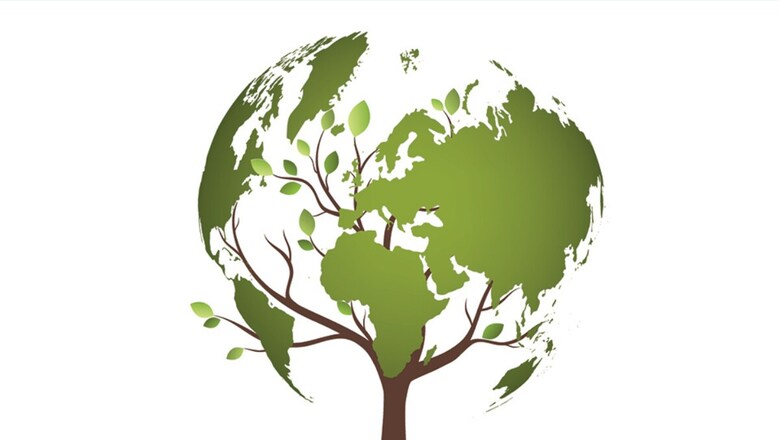
views
Imagine a world where garbage disposal doesn’t threaten public health, pollute rivers, or choke landfills. Sounds idyllic, right?
That’s the very premise of sustainable waste management: an approach that aims to minimise waste generation and maximise its responsible disposal in a way that protects our environment and health. Sustainable waste management often also creates employment opportunities, enhances public health, and promotes community participation. Moreover, sustainable waste management also works hand in hand with the need for effective sanitation, especially in a country like India which defies a one-size-fits-all approach.
Why is sustainable waste management important for sanitation?
According to the World Health Organization (WHO), about 1.5 billion people still lack access to basic sanitation services. One of the key challenges to improving sanitation is the lack of proper waste management.
Improper waste management can lead to:
Spread of diseases: Waste that is not collected or properly disposed can contaminate water sources, soil, and food crops. It can also become a breeding ground for pathogens, insects, rodents, and other vectors that can transmit diseases such as cholera, typhoid, diarrhoea, malaria, dengue, etc. These diseases can affect millions of people, especially children, who are more vulnerable to infections and malnutrition. According to WHO, inadequate sanitation is estimated to cause 829 000 diarrhoeal disease deaths annually, and is a major factor in several neglected tropical diseases. Moreover, when waste is dumped or burned in open spaces, it can release toxic gases and particles that can cause respiratory problems, allergies, asthma, etc.
Environmental pollution: According to the World Bank, The world generates 2.01 billion tonnes of municipal solid waste annually. When waste is improperly disposed it contaminates soil, groundwater, surface water, and affects air quality. This can affect the availability and quality of water used for drinking, irrigation, and other purposes. It can also degrade the natural ecosystems and biodiversity that depend on these resources. Furthermore, when waste is composed of organic materials or plastics, it can emit greenhouse gases such as methane and carbon dioxide that contribute to global warming and climate change.
According to the Central Pollution Control Board’s Annual Report 2020-2021, the total quantity of Solid waste generated in the country is 160038.9 TPD of which 79956.3 TPD (50 %) of waste is treated and 29427.2 (18.4%) TPD is landfilled. Clearly, we need more sustainable solutions to be implemented at scale. Fortunately, we have several successful projects and concepts we can build off of.
Pune’s Garbage Disposal Complex is a state-of-the-art facility that combines waste management practices like composting, biogas generation, and resource recovery. It is already diverting tonnes of waste from landfills, preventing environmental pollution and generating reusable resources. Bhumiproject’s Decentralised Composting is another initiative that empowers communities in Bangalore, India, to turn organic waste into compost using simple, on-site composting units. This not only reduces waste but also provides communities with fertile compost for gardening and agriculture, promoting a sustainable cycle of waste treatment and resource utilisation.
A Toolset for Transformation: Practices and Technologies
By and large, waste not, want not is a good strategy for the way we live our lives, and what we consume. For anyone who lives in a small apartment, regular purging of unused items tends to be a norm. While this is healthy at an individual level, it creates additional burden on our waste management systems. This is where a little forethought (both, when it comes to purchase and disposal) goes a long way.
There are options to consider here. Recycling and upcycling can give materials a second life, reducing reliance on virgin resources and minimising waste generation. India has seen successful initiatives like Chintan’s waste picker cooperatives, empowering informal waste collectors to sort and recycle waste efficiently. Composting our kitchen scraps is a great way to give back to the soil. When practised at scale in communities, it can snowball into big savings. Initiatives like Saahas Zero Waste in Bangalore actively promote community composting, reducing landfill burden and contributing to soil health.
At a municipal level, technologies like incineration and pyrolysis can convert non-recyclable waste into energy, reducing landfill dependence and generating a valuable resource. India is seeing increasing investments in such technologies, offering a sustainable solution for managing non-recyclable waste.
Creating an ecosystem of sustainable waste management
While individual actions are great, collective action is even better. Particularly when it is backed by policy or government initiatives. This is why the Swachh Bharat Mission was the resounding success that it was: it had the backing of the people, of the government, and of the many private enterprises and NGOs that aligned themselves to the cause. It created a momentum that brought us incredible results, and continues to do so.
Creating momentum for sanitation initiatives isn’t new for Harpic, India’s leading brand in the lavatory care segment. For decades now, Harpic has vocally championed the cause of toilet hygiene through innovative and thought provoking campaigns and outreach programs. Together with News18, it also created the Mission Swachhta aur Paani initiative 3 years ago. It is a movement that upholds the cause of inclusive sanitation where everyone has access to clean toilets. Mission Swachhta aur Paani advocates equality for all genders, abilities, castes and classes and strongly believes that clean toilets are a shared responsibility.
Mission Swachhta aur Paani also combines intelligent dialogue between the right stakeholders, ie. government officials, NGOs, activists, sanitation workers, educators and members of the public, with the audience reach News18 brings. It has brought to light many problems our sanitation infrastructure, and sanitation workers face.
Of course, momentum needs people: readers like you. Mission Swachhta aur Paani has created a repository of information in the form of articles, round table discussions and video content on every aspect of India’s sanitation challenges. As a nation, we’ve made an excellent start with the Swachh Bharat Mission, but it will take concerted action and intention from all of us to get it past the line.
Join us here to understand the role you can play in helping usher in a Swasth and Swachh Bharat.




















Comments
0 comment